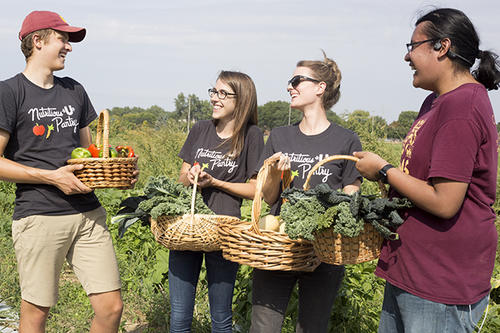
On the Twin Cities campus in St. Paul, the oversized garden that helps supply fresh vegetables for Boynton Health's Nutritious U food pantry is lush and healthy, according to Rebecca Leighton, the health promotion specialist who brought the idea for a pantry to life three years ago.
This year the garden will come in especially handy, as Leighton point outs that college students are also suffering from the food insecurity issues laid bare by the COVID-19 pandemic.
Leighton says that according to preliminary survey data and anecdotal information, some students have lost their jobs or experienced reduced hours due to COVID, and others lost SNAP (food stamps) benefits. “And a lot of students have had unexpected expenses come up because of COVID,” she says. “So things that were already a risk factor if you have low income just get really exacerbated at a time like this.”
Before the pandemic hit, Boynton's Nutritious U pantry in Coffman Union was open one week a month for three days, and averaged about 800 student visits per month. It’s an apples-to-oranges comparison, but from March 16-Aug. 5 there have been 2,678 students visits. That’s less visits per month, but there are fewer students near campus and the pantry has never before been open in the summer. Now it’s open every week.
The food pantry’s mission is twofold. “Number one is to simply help reduce students’ stress around accessing food, and then number two is to help students get enough to eat in the month that they visit the food pantry,” Leighton says. “For the past three years we’ve been measuring that, and consistently 90 percent of students feel reduced stress and [about] 86 percent of students, on average, feel like they got enough to eat because of the food pantry.”
Students can choose the foods they want. Staples include apples and oranges, canned mandarin oranges and peaches; sweet potatoes, carrots, onions, and shelf-stable canned vegetables; white and brown rice and various pastas; and proteins like peanut butter, tuna, and beans.
The harvest from the garden in St. Paul—butternut squash, kale, bell peppers, Brussels sprouts, and more—will supplement the pantry come September; it’s food tended to all summer by the Nutritious U student leadership team and volunteers.
Leighton, a registered dietician with a master’s in public health nutrition from the School of Public Health, only wishes that we could crack some of the underlying problems of food insecurity, which for students include tuition that’s rising faster than state support and need-based grants, and housing affordability.
“Emergency food is really a symptom of a broken system, so having a food pantry and having more people come [to it] is the result of the system failing the people that we’re serving by them not having enough money to access their basic needs and having to get it in this way, rather than a more dignified way,” says Leighton. “Success to me would be zero people coming to the food pantry.”
Boynton Health's Nutritious U Pantry is part of the One Big Week Big 10 Giving Challenge from September 12-18. Visit the One Big Week for Boynton Health's Nutritious U Pantry page to donate.




